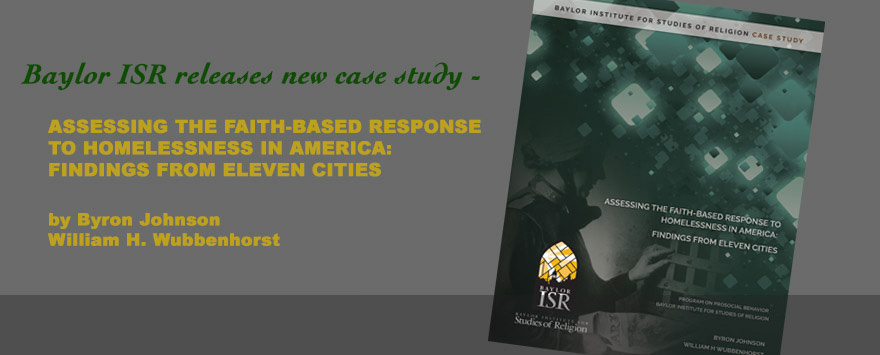Faith-Based Organizations Shoulder Majority of Crucial Services and Develop Creative Solutions for Homelessness, New Baylor University Study Says

Media Contacts: Andy Hallmark, 202-257-5897
Terry Goodrich, 254-710-3321
Follow Baylor Media Communications on Twitter: @BaylorUMedia
WASHINGTON, D.C. (Feb. 1, 2017) — Faith-based organizations are at the forefront of addressing root causes of homelessness, providing not only the majority of emergency shelter beds but innovating long-term solutions, a new study by Baylor University’s Institute for Studies of Religion concludes. Released today at the National Press Club, the study looked at homelessness in 11 sample cities and is part of a growing body of independent research examining the socio-economic impact of faith-based organizations across the United States.
“The data in this study sheds light on the largely overlooked, significant role of the multi-faith sector in addressing the homelessness challenge in urban and rural communities and doing so in innovative ways,” said Byron R. Johnson, Ph.D., Distinguished Professor of Social Sciences and director of the Institute for Studies of Religion at Baylor University. “This research is helpful because it reveals the mainly untold story of the socio-economic impact of faith-based organizations on the common good health and flourishing of whole communities.”
According to the study, faith-based organizations provide 58 percent of emergency shelter beds in the 11 cities surveyed across the nation, in addition to providing an array of vital services and personalized interventions necessary for long-term recovery and independence. These services include, but are not limited to, education, healthcare, job training and addiction recovery. As a result, the study estimates that faith-based organizations create $9.42 in taxpayer savings for every $1 invested by the government. It further shows an estimated $119 million in tax savings in the 11 cities during the three years following implementation of faith-based Residential Recovery and Job Readiness programs.
According to the Baylor study, Residential Recovery and Job Readiness programs are an area where faith-based organizations are “at the forefront of program innovation and organizational transformation for improving positive outcomes for the homeless individuals and families” (page 7, Executive Summary).
“In most cases, people become homeless due to a range of complex personal and societal factors, not just because they cannot afford a home. Our conclusions demonstrate that faith-based organizations are in a unique position to treat the systemic issues that create homelessness to develop sustainable solutions for both individuals and municipalities,” Johnson added.
The research also illuminates how collaboration among faith-based, community groups, private industry, and local, state and federal government agencies creates the strongest responses to homelessness and its underlying issues.
“As the mayor of Indianapolis, I worked hand-in-hand with faith-based organizations to provide services to those experiencing homelessness,” said Greg Ballard, former mayor of Indianapolis. “This study takes an important step toward illuminating the magnitude of these organizations’ social and economic contributions to communities around the country.”
For the project, Johnson and coauthor William Wubbenhorst collected data and interviewed individuals in both faith-and non-faith-based organizations across the country during 2016. The goal was to better understand how homelessness has increased or decreased in 11 diverse cities around the country, quantify faith based organizations’ interventions in homelessness and related issues, and estimate taxpayer savings associated with Residential Recovery and Job Readiness programs.
Media may access the report, an executive summary and explainer graphics at https://www.baylorisr.org/publications/case-studies/. To speak with the study’s authors or community and faith-based organizational leaders across the country included in study, please contact Andy Hallmark at 202-257-5897.
ABOUT BAYLOR UNIVERSITY
Baylor University is a private Christian University and a nationally ranked research institution. The University provides a vibrant campus community for more than 16,000 students by blending interdisciplinary research with an international reputation for educational excellence and a faculty commitment to teaching and scholarship. Chartered in 1845 by the Republic of Texas through the efforts of Baptist pioneers, Baylor is the oldest continually operating University in Texas. Located in Waco, Baylor welcomes students from all 50 states and more than 80 countries to study a broad range of degrees among its 12 nationally recognized academic divisions.
ABOUT THE INSTITUTE FOR STUDIES OF RELIGION
Launched in August 2004, the Baylor Institute for Studies of Religion (ISR) exists to initiate, support and conduct research on religion, involving scholars and projects spanning the intellectual spectrum: history, psychology, sociology, economics, anthropology, political science, epidemiology, theology and religious studies. The institute’s mandate extends to all religions, everywhere, and throughout history, and embraces the study of religious effects on prosocial behavior, family life, population health, economic development and social conflict.